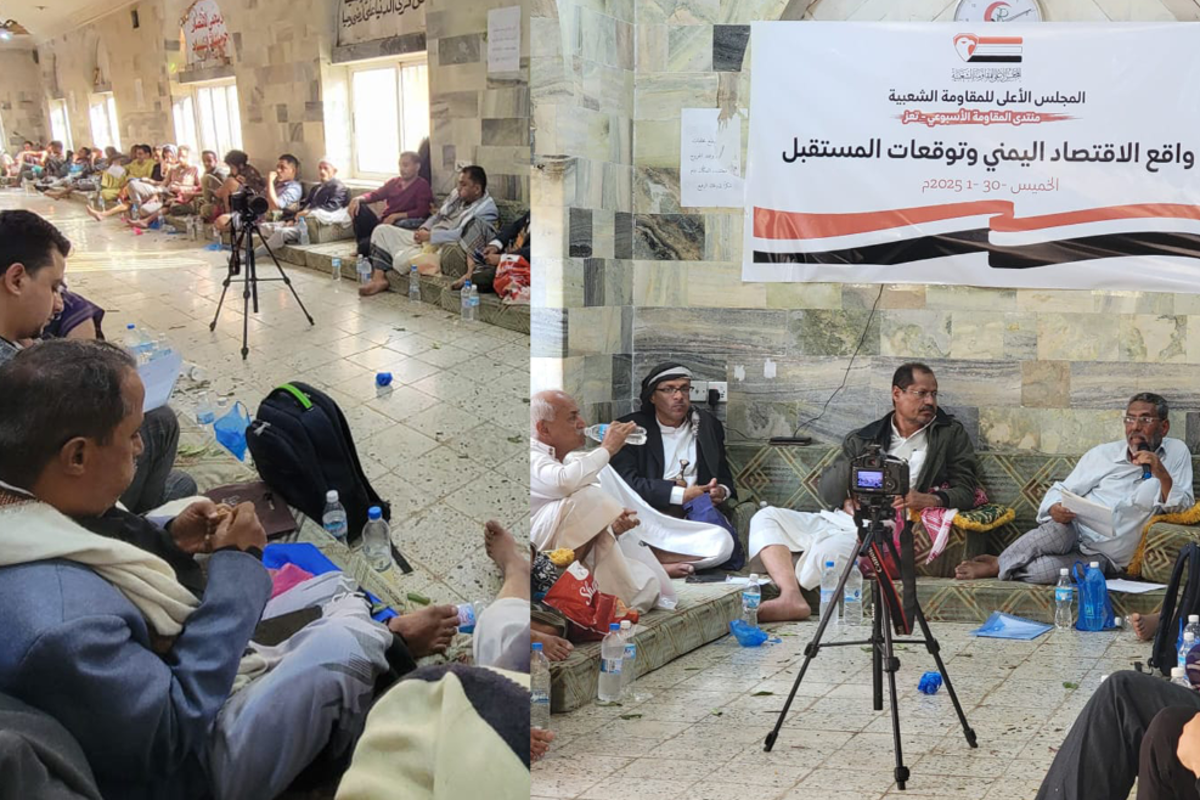Economists: Currency Speculation through Central Bank Auctions is a "Wrong Policy"
2025-02-09
Resistance Forum Discusses Economic Situation in Yemen
Economists: Currency Speculation through Central Bank Auctions is a "Wrong Policy"
Taiz/Private
The weekly Resistance Forum discussed the economic situation in Yemen in light of the catastrophic and unprecedented collapse of the local currency, and the lack of official moves to confront this economic deterioration that has doubled the suffering of citizens.
This came during the forum held in the Sala District, where Professor of Economics at Taiz University, Professor "Mohammed Qahtan", spoke about "the reality of the Yemeni economy and future prospects", where he began his paper by reviewing the series of deterioration of the local currency against foreign currencies, since the early nineties, and the sharp collapse of the Yemeni riyal since the Houthi coup on September 21, 2014 until today.
Professor Mohammed Qahtan presented a set of proposals to confront the collapse of the exchange rate of the national currency, in the field of managing the financial and banking apparatus of the state.
The economic expert stressed the need to oblige all state employees, regardless of their titles and levels, to return from abroad to the country, and to immediately stop paying salaries or any other expenses to them in US dollars or any foreign currency, considering this a constitutional and legal crime whose perpetrators are punished, with the importance of criminalizing perpetrators of this behavior in any circumstance the state is going through, which would limit external public spending and provide large sums of money to the state treasury.
Qahtan called for confronting the current division of the Yemeni currency, the banking system, and monetary and financial policies, stressing the need to frame all grants, aid, loans, and cash flows coming from outside Yemen in foreign currencies in the Yemeni banking system, so that they flow through the Central Bank of Yemen and the unified network of its banking system, as this would help stabilize the exchange rate and confront economic fluctuations.
Qahtan also referred to working on an economic policy that encourages raising the efficiency of the Yemeni export apparatus, so that oil and gas are exported, and in addition to that, other commodity exports are encouraged in which Yemen has comparative advantages in foreign markets, especially the markets of neighboring countries, such as marine products, agricultural products, livestock, honey, minerals, industrial rocks, incoming tourism from abroad, handicraft products, and others.
The professor of economics at Taiz University pointed out that the Central Bank participates in currency speculation through auctions that have not benefited the currency. He considered this "a wrong policy by the bank."
For their part, a number of participants in the forum presented interventions in which they expressed their opinions on the tragic economic reality in Yemen and the worsening suffering experienced by citizens as a result of the catastrophic collapse of the local currency, as the exchange rate of one dollar exceeded 2200 riyals.
The participants criticized the poor performance of the presidency and the government, denouncing the absence of any serious and tangible moves to save the local currency from this deterioration that has exacerbated the living conditions of citizens. They also stressed the need to resolve the national battle and end the Houthi coup, as it is the main cause of this economic disaster.
